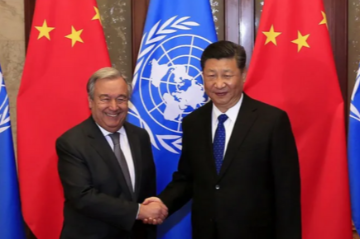Observer Research Foundation-Kolkata and Tagore's Cheena Bhavana at Visva-Bharati University co-hosted a day-long series of discussions, an evening of cultural interactions, and a half-day of intensive Mandarin language lessons.

Observer Research Foundation-Kolkata and Tagore’s Cheena Bhavana at Visva-Bharati University recently co-hosted a day-long series of discussions, an evening of cultural interactions, and a half-day of intensive Mandarin language lessons. These events were part of ORF’s
Project Lingua China initiative, a pragmatic approach to learning Chinese cultural, social, and humanistic nuances through the language lens.
A laborious and lively day of debate and dialectics on critical contemporary India-Sino issues was inaugurated by Dr. Avijit Banerjee, Dean of the Cheena Bhavana, followed by an evening of cross-cultural friendship-making over games and delicious home-style Bengali cuisine. The exchange wrapped up with an intensive half-day language session with native-speaking Mandarin teachers from Hubei, Fujian, and beyond.
The symposium, held last month, began with a presentation by a visiting Chinese language teacher on the value of learning Mandarin, a story of numbers; one in every five or six people speak Chinese; a whopping 1.5 billion globally; and over 100 million are learning it as their second language, the presenter gathered. But more importantly, "this new ’Lingua Franca’, is about winning the hearts and minds of China enthusiasts worldwide" he added.
Beyond the language link, presentations given by more than 15 budding scholars followed with debate over contentious topics as territorial integrity overland and at sea; nuances of the 1962 war; India and China’s influence on the development of Myanmar, and in the greater South and Southeast Asian region, among others. Differences in conviction on politics and life were expressed as fervor filled the otherwise laissez-faire Cheena Bhavana air with intellectual brabbles, squabbles, tiffs and tangles.
Presenters introduced stories of the earliest linkages between India and China; starting with figures as early as mid-7th Century’s Xuan Zang (a Chinese monk and devotee who, maybe the first, spread Buddhism from India to the east). Nostalgically, students told stories of the institute’s legacy, being supported by important political figures including China’s once nationalist leader, General Chiang Kai Shek, who donated precious and rare ancient literature to the Cheena Bhavana library. Not to forget about Tagore, who himself established the institute in 1937 with hopes to reconnect the already long lost ties between the two cultures. In further reverence, a flash choir broke loose in vocals among the Indian Cheena Bhavana students, performing a Chinese pop love song, to pay tribute to this gathering of two cultures in friendship. Love, not unrequited, the Chinese visiting students showed their respect at the end of the day, joining the group with closed eyes and humming along to the tune of ’Amader Shantiniketan’, Visva-Bharati’s theme song written by none other than, Rabindranath Tagore.
Further merrymaking carried into the night with round-robin group games using a mix of languages. Chinese teachers assigned their Indian students with Chinese names, for example, "Léi", meaning thunder, and "Chéng" meaning innocence; and together "Léi Chéng", conveying a sense of being big and friendly, was the name given to one student who appeared to his newly made Chinese friend as a ’gentle giant’ as was said. The cultural activities lent space for more meaningful interactions, tête-à-tête, as the inquisitive nature of these two peoples bubbled up to the surface and led to deeper conversations about each other’s ages-old cultures. It really was an evening of evoking, ironically, that Nehru-era adage: ’’Hindi-Chini Bhai Bhai’, said Dr. Banerjee, (which means, in Hindi, ’India China, Brotherhood’).
Several participants expressed concern about the current ’stalemate’ state of India-China relations, as one Indian student put it. The cost of stagnant relations far outweighs the benefit of keeping to this status quo, said a Chinese student in agreement. Further, it was agreed upon by participants from both sides, that the comparatively advantageous and unique distinctions in economic strengths of the two powerhouses must certainly be better understood by the masses and by influential persons in business and politics. In further agreement, a Chinese presenter, talking about China and India’s influence on Myanmar’s development, expressed her concern with the need for both countries to become more responsible leaders in the greater South and Southeast Asian region, and to work with each other in that direction.
Another presenter emphasized that, in order to understand the potential value in improved India-China relations, one would need to take a journey back and review early instances of exchange between the two. The Chinese, he said, may be the first to tell you that some of that country’s most prized cultural treasures were, in their very roots, influenced by and even borrowed from India. From Ayurved to Chinese Medicine, from Yoga to Wushu (martial arts), and from the reaches of spiritual roots of Hinduism and then Buddhism’s influence on Chinese philosophy such as with the "Dao"ist ’way’, he said, continue to be found and practiced in the lives of contemporary Chinese, even today.
Another space needing dire attention, as expressed by some presenters, is the need to upgrade physical connectivity between the two countries and, led by them, in the greater shared South and Southeast Asian region. Projects like the BCIM Economic Corridor, noted one presenter, may offer real opportunities for both countries to improve trade relations and a space for greater sustainable and responsible leadership in the region.
(Join us in the journey of exploring Chinese culture through the language lens; come along for a Lingua China experience, offered in an intensive immersion setting, in-house tailored lessons, or in fixed sessions every Saturday at ORF-Kolkata. For more information contact: [email protected])
The views expressed above belong to the author(s). ORF research and analyses now available on Telegram! Click here to access our curated content — blogs, longforms and interviews.




 PREV
PREV
